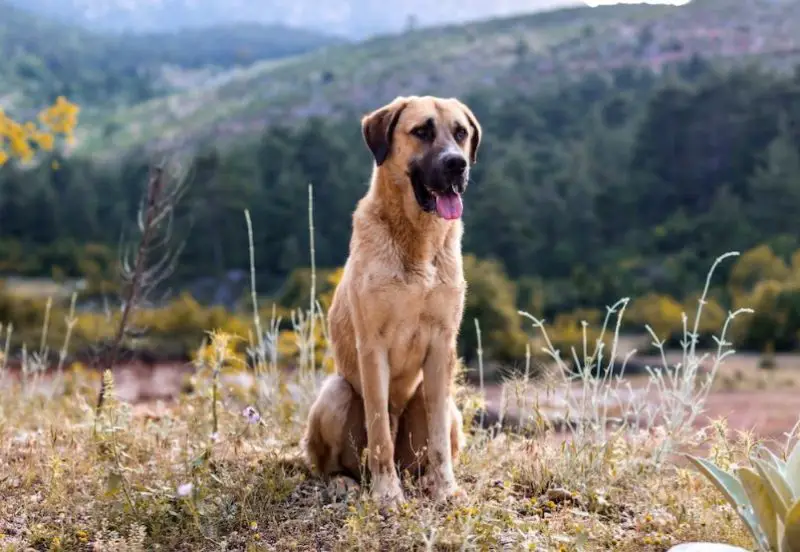The Anatolian Shepherd Dog is a breed that has captured the admiration of dog lovers worldwide for centuries due to its impressive size, strength, intelligence, and protective instincts. Renowned for their loyalty and ability to guard, these dogs are not only exceptional protectors but also devoted companions.
This in-depth guide will take you through everything you need to know about the Anatolian Shepherd Dog, from their ancient origins to their modern-day roles as both guardians and family pets, as well as offering insight into their physical traits, behavior, and care requirements.
Origins of the Anatolian Shepherd Dog

The Anatolian Shepherd Dog hails from the Anatolian Plateau in Turkey, where it has been an integral part of the local culture for thousands of years. These dogs were originally bred by Turkish shepherds to protect livestock, such as sheep and goats, from predators like wolves, bears, and even human threats. Their strong guarding instincts, agility, and courage allowed them to fulfill this important role with great effectiveness. Over time, they developed a unique combination of traits, such as independence, resilience, and a calm demeanor, which made them well-suited to the harsh conditions of the Anatolian Plateau, where they faced extreme temperatures and rugged landscapes.
Historical Significance
The history of the Anatolian Shepherd Dog stretches back to ancient times, with evidence suggesting that the breed’s ancestors were present in the region for centuries. Carvings and ancient artifacts depicting dogs resembling the Anatolian Shepherd have been discovered, solidifying their importance throughout history. These dogs were highly valued for their ability to work autonomously, which was essential in the demanding role of guarding large herds across expansive areas. Their independent nature also made them less reliant on human intervention, allowing them to thrive in remote locations where shepherds would often be far away for extended periods.
Role in Modern Times
In modern times, the Anatolian Shepherd Dog continues to serve its traditional role as a livestock guardian. While they are still used by shepherds in rural areas of Turkey and other parts of the world, the breed has also gained popularity as a family companion and security dog. Their calm, protective nature makes them an excellent choice for people seeking a reliable guard dog who can also integrate well into family life. Despite their independent nature, they form deep, loyal bonds with their families and can be incredibly affectionate with those they consider part of their pack.
Physical Characteristics
Anatolian Shepherd Dogs are large, robust dogs that exude strength and power. Their physical traits are built for endurance and protection, making them well-suited for guarding livestock in the wild.
Size and Weight
Anatolian Shepherd Dogs are considered a large breed, with males typically standing between 29 and 32 inches tall at the shoulder, while females tend to be slightly smaller, ranging from 27 to 31 inches. In terms of weight, males generally weigh between 110 and 150 pounds, while females weigh between 80 and 120 pounds. This size allows them to handle potential threats effectively, whether from wild animals or intruders.
Coat and Colors
The breed has a double coat, which is thick and weather-resistant, offering protection from the elements. Their coats are designed to keep them comfortable in both hot summers and cold winters, which is crucial for a breed that was historically used in harsh climates. The coat is often medium to long in length, requiring regular maintenance to keep it in good condition.
Common coat colors include:
- Fawn with a black mask: This is one of the most recognizable color patterns.
- White: Some Anatolian Shepherd Dogs have an entirely white coat.
- Brindle: This pattern consists of dark and light stripes.
- Piebald: These dogs have patches of white mixed with other colors, often fawn or brindle.
Lifespan
The Anatolian Shepherd Dog generally enjoys a long lifespan for a large breed, with most living between 11 and 15 years. This longevity is a testament to their overall health and resilience, although like all breeds, they are prone to specific health issues.
Temperament and Behavior
Anatolian Shepherd Dogs are known for their strong guarding instincts and independent nature. These traits, when managed properly, make them excellent protectors of both livestock and family.
Protective Nature
One of the defining characteristics of the Anatolian Shepherd Dog is its unwavering protective instinct. They are highly alert and can be naturally suspicious of strangers, making them excellent guard dogs. However, this strong protective drive must be managed through proper training and socialization to ensure they can distinguish between real threats and harmless situations, especially in a family setting.
Independence
As a breed originally developed to work autonomously in remote areas, the Anatolian Shepherd Dog is known for its independence. While this quality makes them highly capable in their role as livestock guardians, it can also make training more challenging. They are not typically eager to please like some other breeds, and they tend to think for themselves, which can sometimes result in stubbornness.
Calm and Loyal
Despite their imposing presence, Anatolian Shepherd Dogs are typically calm and laid-back, especially when at home with their family. They are deeply loyal and form strong bonds with their owners, often becoming very protective of them. Their affectionate nature makes them great companions for those who appreciate their more reserved demeanor.
Training and Socialization
Training an Anatolian Shepherd Dog requires patience, consistency, and a deep understanding of their independent nature. These dogs are intelligent, but they do not always respond well to traditional training methods, as they prefer to make their own decisions.
Early Socialization
Early and ongoing socialization is essential to ensure that your Anatolian Shepherd Dog grows into a well-adjusted adult. Exposing them to different environments, people, and animals from a young age helps prevent fearful or aggressive behavior in new situations. It also teaches them to differentiate between real threats and non-threatening situations, which is vital for any dog with a strong guarding instinct.
Positive Reinforcement
Using positive reinforcement methods—such as treats, praise, and rewards—works best with the Anatolian Shepherd Dog. These dogs tend to respond better to a firm but gentle approach rather than harsh methods, which could damage the trust between dog and owner. Setting clear boundaries and maintaining consistency in your training will help them understand their place within the family hierarchy.
Setting Boundaries
Establishing clear rules from the beginning is key to a successful training process. Anatolian Shepherd Dogs are naturally independent thinkers, so it’s important to reinforce your role as the leader while respecting their intelligence and decision-making abilities.
Challenges in Training
While highly intelligent, these dogs can sometimes be stubborn and difficult to train, especially if they are not motivated by rewards or clear leadership. Patience is crucial, and owners should be prepared to deal with challenges in training, particularly in the early stages.
Exercise and Activity Levels
Anatolian Shepherd Dogs are moderately active and require regular physical and mental exercise to stay healthy and happy. Their activity levels vary depending on their age and environment, but they do best when they have ample space to roam and engage in their natural guarding or herding behaviors.
Daily Exercise Needs
Anatolian Shepherd Dogs need at least 1-2 long walks daily to keep them fit and mentally stimulated. In addition to regular walks, they benefit from playtime and interactive activities that help challenge their minds and bodies. If possible, provide them with tasks that allow them to use their natural guarding instincts, such as guarding your home or property.
Mental Stimulation
These intelligent dogs require mental stimulation to prevent boredom, which can lead to undesirable behaviors. Puzzle toys, obedience training, and the introduction of new commands are great ways to keep their minds sharp and engaged.
Diet and Nutrition
Feeding your Anatolian Shepherd Dog the right diet is essential for maintaining their health, energy, and overall well-being.
Nutritional Requirements
A high-protein diet is important for this breed, as it helps maintain muscle mass and supports their active lifestyle. Healthy fats, such as omega-3 and omega-6 fatty acids, are essential for maintaining a healthy coat and skin. Carbohydrates provide energy for daily activities, while vitamins and minerals support their immune system and overall health.
Feeding Guidelines
Puppies typically require 3-4 small meals per day to support their growth and development. As they mature, you can transition to feeding them 2 larger meals per day. Be sure to adjust portion sizes based on your dog’s age, weight, and activity level, and consult your veterinarian for specific recommendations.
Foods to Avoid
Certain foods are toxic to dogs and should be strictly avoided. These include chocolate, grapes, onions, and excessive amounts of fat or salt, all of which can be harmful to your Anatolian Shepherd Dog.
Health and Grooming
Like all breeds, Anatolian Shepherd Dogs are prone to certain health issues. Regular vet check-ups and a consistent grooming routine are essential to keeping them healthy and comfortable.
Common Health Issues
Some of the health concerns that can affect Anatolian Shepherd Dogs include:
- Hip Dysplasia: A common condition in large breeds where the hip joint is malformed.
- Entropion: A condition where the eyelids roll inward, causing irritation.
- Hypothyroidism: A hormonal imbalance that can affect metabolism and energy levels.
- Bloat: A life-threatening condition where the stomach twists, requiring immediate medical attention.
Regular Vet Check-ups
Scheduling regular veterinary visits is important for monitoring your dog’s health and addressing any issues early. Routine vaccinations, parasite control, and dental care are all part of maintaining a healthy dog.
Grooming Routine
The thick double coat of the Anatolian Shepherd Dog requires regular grooming. Brushing once a week helps remove loose hair and prevent matting. Bathing should be done only when necessary, as frequent bathing can strip the coat of its natural oils. Nail trimming, dental care, and regular ear checks are also important aspects of grooming.
Is the Anatolian Shepherd Dog Right for You?
Before deciding to bring an Anatolian Shepherd Dog into your home, it’s essential to consider their specific traits and whether they align with your lifestyle. These dogs are best suited for people with experience in handling large, independent breeds and those who can provide them with the space and attention they need.
Ideal Owner Traits
An ideal owner for an Anatolian Shepherd Dog should have:
- Space: A large yard or open space where the dog can roam and guard.
- Experience: A background in managing independent breeds or large dogs.
- Time and Commitment: The ability to dedicate time for training, exercise, and care.
Family Compatibility
Anatolian Shepherd Dogs can make excellent family pets, especially if they are properly trained and socialized from a young age. Their protective instincts make them great with children and they will fiercely defend their family. However, their strong territorial nature may require supervision when introducing them to unfamiliar guests.
Conclusion
The Anatolian Shepherd Dog is a majestic breed with a rich history, a calm yet protective temperament, and a fierce loyalty to its family. Whether serving as a dependable livestock guardian or as a devoted companion, this breed has much to offer those who understand its needs and characteristics. With the right training, exercise, and care, an Anatolian Shepherd Dog can become a lifelong friend and protector.






